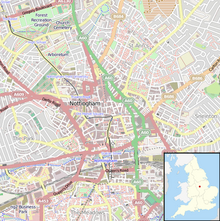Hounds Gate
 Hounds Gate | |
| Maintained by | Nottingham City Council |
|---|---|
| Coordinates | 52°57′7″N 1°9′3″W / 52.95194°N 1.15083°W |
Hounds Gate (also known as Houndsgate) is an historic street in the centre of the city of Nottingham between St Peter’s Square and Castle Road.
History
[edit]
The early name for the street was Hungate and it was referred to as such in 1326[1] and appears in this form on John Speed’s map of Nottingham of 1610.[2] It is thought it received this name from being where part of the kennels for Nottingham Castle were situated.
The paving of the street was the responsibility of the inhabitants of the parish of St. Nicholas, and in 1808 the Grand Jury returned a Bill of Indictment for the poor state of the street[3] The street was repaired in 1809 at a cost of £60 (equivalent to £5,499 in 2023).[4]
The street was bisected in 1958 by the construction of Maid Marian Way, resulting in the loss of several fine properties.
Notable buildings
[edit]- 1. By William Arthur Heazell 1887[5]
- 3 and 5. Town house. Mid 18th century. Grade II listed.[6]
- 7 and 9. Town house. Mid 18th century. Grade II listed.[7]
- 11. Town house. Mid 18th century. Grade II listed[8]
- 13. Warehouse by John Howitt and Son 1921-22.
- 15. By G. Bell and Sons. 1886-87.
- 17-21. James Snook & Co, drapers and haberdashers by Robert Evans and William Jolley 1894-95. Bridge added in 1923 by Arthur Brewill and Basil Baily.
- Salutation Inn. 16th century. Grade II listed[9]
- Chartwell House. 67 and 69. Town houses. 18th century. Grade II listed[10]
- 70 and 72. Town house ca. 1900. Grade II listed[11]
- 74. Offices by James McCartney 1980[12]
- 76. Town house ca. 1900. Grade II listed[13]
References
[edit]- ^ Holland Walker, J (1928). "An itinerary of Nottingham". Transactions of the Thoroton Society. 32: 6. Retrieved 21 January 2019.
- ^ Whitfield, David (31 December 2018). "These are the 35 streets that originally made up Nottingham". Nottingham Evening Post. Retrieved 21 January 2019.
- ^ Records of the Borough of Nottingham. Vol 8. 1800-1835. Thomas Forman & Sons, Nottingham. 1914. p. 75.
- ^ UK Retail Price Index inflation figures are based on data from Clark, Gregory (2017). "The Annual RPI and Average Earnings for Britain, 1209 to Present (New Series)". MeasuringWorth. Retrieved 7 May 2024.
- ^ Harwood, Elain (2008). Pevsner Architectural Guides. Yale University Press. p. 95. ISBN 9780300126662.
- ^ Historic England, "3 and 5, Hounds gate (1254607)", National Heritage List for England, retrieved 21 January 2019
- ^ Historic England, "7 and 9, Hounds gate (1247641)", National Heritage List for England, retrieved 21 January 2019
- ^ Historic England, "11, Hounds gate (1270773)", National Heritage List for England, retrieved 21 January 2019
- ^ Historic England, "Salutation Inn (1255137)", National Heritage List for England, retrieved 21 January 2019
- ^ Historic England, "Chartwell House (1247643)", National Heritage List for England, retrieved 21 January 2019
- ^ Historic England, "70 and 72, Hounds gate (1270774)", National Heritage List for England, retrieved 21 January 2019
- ^ Harwood, Elain (2008). Pevsner Architectural Guides. Yale University Press. p. 64. ISBN 9780300126662.
- ^ Historic England, "76, Hounds gate (1247644)", National Heritage List for England, retrieved 21 January 2019

